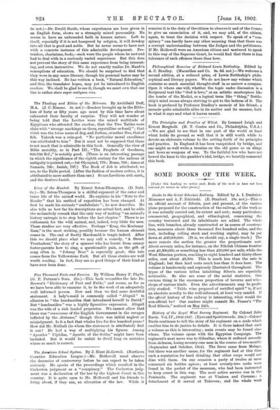Lives of the Hunted. By Ernest Seton-Thompson. (D. Nutt. (3s.)—Mr.
Seton-Thompson is a skilful exponent of the outer and inner life of the maims!! world. He explains in his "Note to the Reader" that his method of exposition has been changed. At first he made his animals " confabulate " ; he now describes. He also tells us how far his descriptions are actual fact, and he adds the melancholy remark that the only way of making "an animal's history untragic is to stop before the last chapter." There is no euthanasia for the wild, animal, and, indeed, very little for men. These studies are very effective. Perhaps "King, the Kootenay Ram," is the most striking, possibly because the human element comes in. The end of Scotty Macdonald is tragic indeed. After this we should place what we may call a comedy, "A Street Troubadour," the story of a sparrow who has learnt from canary foster-parents how to sing, a questionable gain, as the gift of song often is. "Johnny Bear" is especially good; this tale comes from the Yellowstone Park. But all these stories are well worth reading. In fact, they are as good things of their kind as have ever been done.










































 Previous page
Previous page